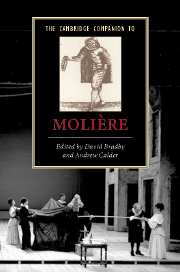Book contents
- Frontmatter
- 1 The career strategy of an actor turned playwright: 'de l’audace, encore de l’audace, toujours de l’audace’
- 2 The material conditions of Molière’s stage
- 3 The master and the mirror: Scaramouche and Molière
- 4 Molière as satirist
- 5 How (and why) not to take Molière too seriously
- 6 L’Avare or Harpagon’s masterclass in comedy
- 7 Laughter and irony in Le Misanthrope
- 8 Comédies-ballets
- 9 Le Bourgeois gentilhomme: Molière and music
- 10 Medicine and entertainment in Le Malade imaginaire
- 11 Molière and the teaching of Frenchness: Les Femmes savantes as a case study
- 12 L'École des femmes: matrimony and the laws of chance
- 13 Molière nationalised: Tartuffe on the British stage from the Restoration to the present day
- 14 Landmark twentieth-century productions of Molière: a transatlantic perspective on Molière: mise en scène and its historiography
- 15 Dom Juan the Directors’ Play
- 16 ‘Reculer pour mieux sauter’: modern experimental theatre’s debt to Molière
- Select bibliography
- Index
- Series List
9 - Le Bourgeois gentilhomme: Molière and music
Published online by Cambridge University Press: 28 March 2007
- Frontmatter
- 1 The career strategy of an actor turned playwright: 'de l’audace, encore de l’audace, toujours de l’audace’
- 2 The material conditions of Molière’s stage
- 3 The master and the mirror: Scaramouche and Molière
- 4 Molière as satirist
- 5 How (and why) not to take Molière too seriously
- 6 L’Avare or Harpagon’s masterclass in comedy
- 7 Laughter and irony in Le Misanthrope
- 8 Comédies-ballets
- 9 Le Bourgeois gentilhomme: Molière and music
- 10 Medicine and entertainment in Le Malade imaginaire
- 11 Molière and the teaching of Frenchness: Les Femmes savantes as a case study
- 12 L'École des femmes: matrimony and the laws of chance
- 13 Molière nationalised: Tartuffe on the British stage from the Restoration to the present day
- 14 Landmark twentieth-century productions of Molière: a transatlantic perspective on Molière: mise en scène and its historiography
- 15 Dom Juan the Directors’ Play
- 16 ‘Reculer pour mieux sauter’: modern experimental theatre’s debt to Molière
- Select bibliography
- Index
- Series List
Summary
With Le Bourgeois gentilhomme (1670), Jean-Baptiste Molière and Jean- Baptiste Lully created a masterwork of musical comedy. This was the ninth collaboration of their seven-year association, and Le Bourgeois gentilhomme became by far their most popular work - one that remained among Louis XIV's favourite entertainments throughout his life. This comédie-ballet, glowing with comic inspiration, proved 'les deux grands Baptistes' (as Mme de Sévigné called them) to be simply the best team of comic collaborators before Mozart and da Ponte. In fact, it was for Le Bourgeois gentilhomme that Molière coined the term comédie-ballet.
Le Bourgeois gentilhomme also marked a new direction in the genre of comédie-ballet. The early comédies-ballets were intended for court fêtes in which the King and his courtiers would participate as dancers in the intermèdes [musical interludes]. Louis XIV had performed a variety of colourful and exotic roles in these early works - including those of gypsy (Le Mariage forcé), peasant (La Pastorale comique) and Moor (Le Sicilien). But after the King's retirement from the stage with Les Amants magnifiques (where he was to portray Neptune in the first intermède, and Apollo in the last) the genre broke with tradition. Le Bourgeois gentilhomme was the first wholly professional comédie-ballet in which noble amateurs did not participate.
As with many of the earlier comédies-ballets, Louis XIV had a hand in selecting the subject matter. The visit of an envoy, Suleïman Aga, from November 1669 until May 1670 provided the comic inspiration for the central musical episode. This diplomat, charged with repairing diplomatic relations between France and the Ottoman Empire, proved a difficult personality.
- Type
- Chapter
- Information
- The Cambridge Companion to Moliere , pp. 121 - 138Publisher: Cambridge University PressPrint publication year: 2006



